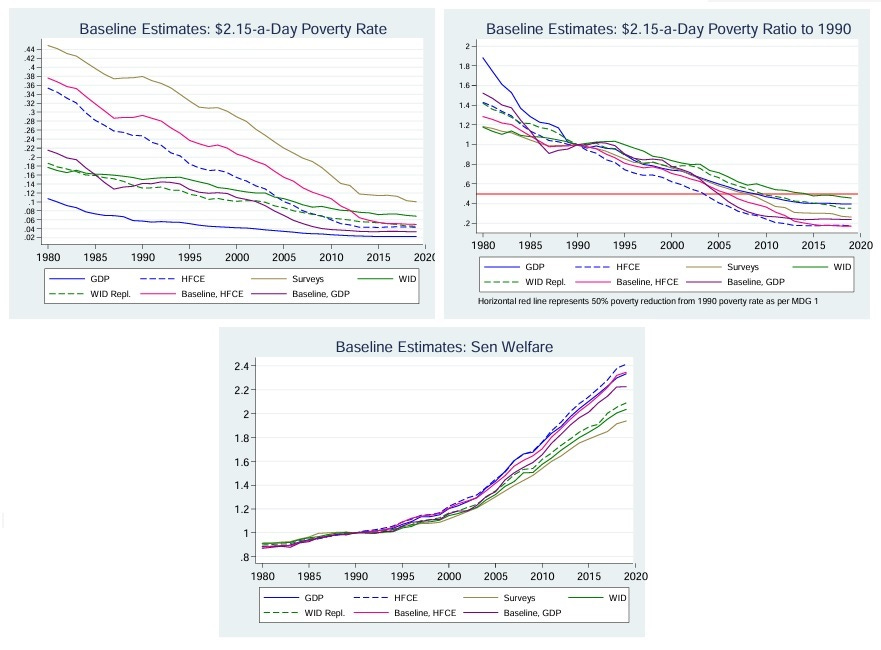🌍📈 The world is a less impoverished and more equal place than you think
Don't let the Down Wing pessimists tell you otherwise. They're wrong. Again.
Quote of the Issue
“The better we get at getting better, the faster we will get better.” - Douglas Engelbart
The Conservative Futurist: How To Create the Sci-Fi World We Were Promised
“With groundbreaking ideas and sharp analysis, Pethokoukis provides a detailed roadmap to a fantastic future filled with incredible progress and prosperity that is both optimistic and realistic.”
The Essay
🌍📈 The world is a less impoverished and more equal place than you think
The main theme of this newsletter is that America and the world can do better — much, much better. Still, America is probably doing better than many Americans think. That’s another important theme (one I also cover in my book, The Conservative Futurist). A few quick examples (as mentioned in a previous Faster, Please! issue):
The link between productivity and worker pay. Contrary to popular belief, productivity and wage growth have moved together through the decades, with only modest divergence since 2000.
Income inequality. Data from the Congressional Budget Office shows that income inequality, measured after taxes and transfers, increased by seven percent from 1990 to 2007 but has decreased by five percent since 2007. This suggests that concerns about escalating income inequality may be overstated or outdated.
Worker wages. Real wages have risen significantly from the peak of the 1990 business cycle through 2019, with increases observed both in the consumer price index and the price consumption expenditure index, preferred by the Federal Reserve.
Economic mobility. A significant majority of Americans in their 40s have higher incomes than their parents did at the same age. This is particularly pronounced for individuals raised in the bottom 20 percent of income, where 86 percent exceed their parents' incomes.
More good news: The rest of the world is also probably doing better than most people think, particularly in the areas of poverty and inequality. That, according to the new working paper “Inequality Within Countries is Falling: Underreporting-Robust Estimates of World Poverty, Inequality and the Global Distribution of Income” by economists Maxim Pinkovskiy (NY Fed), Xavier Sala-i-Martin (Columbia), Kasey Chatterji-Len (NY Fed), and William H. Nober (Columbia), or PSCN as I will often refer to them.
The researchers contend with a growing problem for economists trying to analyze income and equality issues, especially for the poorer parts of the global population: Household surveys often underreport income, and this problem is worsening. As such, PSCN proposes a new method to adjust for income underreporting. This approach shows a large but consistent correction to survey-based income and inequality estimates.
(Basically, the economists assume a specific relationship between true and reported incomes, which is the same for everyone in a country in a given year. And to determine this relationship, they compare regional government income data to regional survey data. They then estimate underreporting at different income levels and adjust the survey data accordingly.)
What explains the underreporting? Lots of possibilities: fear of losing welfare benefits, informal work without accurate records, perceiving small earnings as irrelevant, social stigma, concerns about taxation, misunderstanding survey questions, and even the psychological stress, or “cognitive load,” of poverty affecting memory.
Anyway, here are the key findings:
While the rich do underreport their incomes, so do the poor. What’s more, their underreporting has become a more significant part of overall underreporting over time. “Whereas the bottom 50 percent of the global income distribution reported a higher fraction of their income in 1980 than did the top 10 percent, the reverse is true in 2019. Moreover, by 2019, the bottom 50 percent also account for a larger fraction of overall underreporting of disposable income than their survey income share (which has also been rising over this time period).”
Global poverty and inequality have declined since the 1980s, even after adjusting for systematic survey misreporting. The global poverty rate — measured as the percentage of people living on less than $2.15 per day — is just over six percent, according to the PSCN baseline estimate using household final consumption expenditure per capita (the average amount spent by households per person in a country).
But that rate is a higher 10 percent than when using household surveys alone, as with World Bank estimates, for example. What’s more, global welfare, when evaluated through the Sen index — a tool created by economist Amartya Sen in 1996 to assess a population's overall economic health by considering both income levels and their distribution — has seen a significant increase of over 20 percent after adjusting GDP per capita (average economic output per person) or HFCE per capita. “Therefore, even after adjusting for systematic survey misreporting, our results provide a substantially more optimistic picture of the world distribution of income than do the results of the World Bank or of the World Inequality Database.” Wonderful!
(Looking just at the first chart: Using surveys alone (represented by the brown line), global poverty fell from 44 percent in 1980 to just over 10 percent in 2019. Adjusting survey data with national accounts consumption and income inequality measures (represented by the pink line) suggests poverty is far lower than using surveys alone. With these adjustments, global poverty fell from 38 percent in 1980 to 5 percent in 2019, about half as high as using surveys alone. “According to our results, global one-dollar-a-day consumption poverty is about half as high as we would think using surveys alone.”)
Not only has overall global inequality fallen, but this decrease was also reflected in within-country inequality. Since the mid-2000s, inequality within countries, measured using several metrics and considering both the distribution of GDP per capita and HFCE per capita has declined. “Therefore, the recent declines in inequality are driven by both falling across-country inequality and falling within-country inequality, rather than within-country inequality acting as a headwind to global inequality reduction. … Population-weighted within-country inequality according to a range of measures, and for both the GDP per capita distribution and the HFCE per capita distribution, has declined since the mid-2000s to attain levels of the early to mid-1990s.”
The world is making better progress than previously thought in reducing poverty, not just at the extreme poverty line of $2.15 per day, but also at higher poverty thresholds. This is good stuff here, let me quote in full (emphasis by me):
Using the World Bank's preferred poverty lines of $3.65 a day and $6.85 a day (the latter two reflecting the medians of lower-middle-income and upper-middle-income country poverty lines), we find that poverty rates at these higher thresholds have declined to 30% and 50%, respectively, of their 1990 levels for the HFCE per capita world distributions, which is considerably lower than estimated by the World Bank using household surveys alone. Hence, the world distribution of income is less defined by a large "precariat" modestly above an extreme poverty line but liable to fall back into destitution following a global shock, but rather increasingly by a true "global middle class" that is not poor even by upper-middle-income country standards.
As the economists conclude: “In summary, our approach shows that when combining national accounts aggregates with suitably adjusted household survey inequality measures, we find that the world is a less poor and less unequal place than has been thought.”
Which is awesome … and underreported … and too little understood. But it needs to be widely reported and understood. The decline in global poverty, in particular, is evidence that our decisions matter — especially when those decisions boost economic growth through more trade, investment, and overall economic openness.
Micro Reads
Business and Economics
AI Search Startup Perplexity Set to Double Valuation to $1 Billion - WSJ
OpenAI, Salesforce Sign Pledge to Build AI for Good of Humanity - Bberg
AMD's Made-for-China AI Chips Are Too Powerful - Bberg
China offers AI computing ‘vouchers’ to its underpowered start-ups - FT
Apple’s Car Was Doomed by Its Lofty Ambitions to Outdo Tesla - Bberg
AI Talent Is in Demand as Other Tech Job Listings Decline - WSJ
I worked exclusively in Vision Pro for a week—here’s how it went - Ars
A framework for geoeconomics - VoxEU
MIT Scientist Raises $53 Million to Deploy AI for Dentists - Bberg
Policy
Will Big Tech agree to play by Europe’s rules? - FT Opinion
Microsoft derides ‘doomsday futurology’ of New York Times’ AI lawsuit - FT
6 Months After New York Banned Airbnb, New Jersey Is Doing Great - Wired
AI’s Automatic Stabilizers - AEIdeas, Will Rinehart
AI
The AI wars heat up with Claude 3, claimed to have “near-human” abilities - Ars
Meta's AI Watermarking Plan is Flimsy, At Best - IEEE Spectrum
Apple Is Playing an Expensive Game of AI Catch-Up - WSJ
Google launches $5m prize to find actual uses for quantum computers - New Scientist
What Is OpenAI’s ChatGPT Plus? Here’s What You Should Know - Wired
Large language models can do jaw-dropping things. But nobody knows exactly why - MIT Tech Review
Why AI Struggles with Basic Math (and How That’s Changing) - John Bailey, AEIdeas
AI meets Old Masters in the fight to authenticate paintings - FT
The real quandary of AI isn’t what people think - FT Opinion
Health
Do You Really Want to Find Out If You'll Get Alzheimer's? - Bberg Opinion
Ozempic Is Transforming the Health of Denmark’s Economy - Bberg Opinion
Clean Energy
NRC releases plan to speed nuclear reactor build-out - E&E News
Robotics
The robots are coming. And that’s a good thing. - MIT Tech Review
Space/Transportation
Russia Says Working With China for Lunar Nuclear Power Plant - Bberg
Blue Origin is getting serious about developing a human spacecraft - Ars
Why It’s So Challenging to Land Upright on the Moon - NYT
Amid tensions with Russia, SpaceX to launch another astronaut crew - Wapo
Up Wing/Down Wing
‘Dune: Part Two’ Gives Sci-Fi-Obsessed Silicon Valley a Reason to Party - NYT
Stop artificial intelligence before it’s too late, global experts warn - StudyFinds





Nice work James. Jus add this to the pile of evidence: Global poverty is on the decline, despite what the media would have you believe. More people are living better than at any time in human history.
This comes via trade and economic openness. Hence the risk in backsliding when politicians and pundits turn us against the very factors of our own success.
Huh. I knew that since the 90s inequality within nations rose as inequality between fell drastically, resulting in lower global inequality. I am surprised to see inequality within nations also falling. I guess the shift in inequality is settling down after the hyper globalisation phase of the 90s.
Hopefully the increase of renewables in the next ten years will also accelerate global poverty reduction as now small businesses can provide electricity and heating services to firms and individuals as opposed to relying on corrupt governments in developing countries.